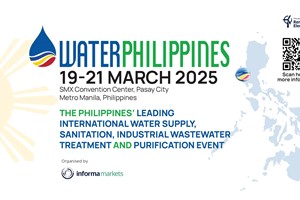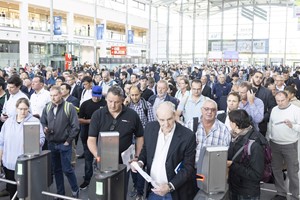The need to intensify collaboration, integration and digitisation, to deliver a vast programme of works in AMP8 – the asset management plan period 2025-30 – was one of the themes under discussion at British Water’s first annual conference, which took place in Manchester on 21 November 2023.
Delivering a keynote address, Jane Simpson, commercial, engineering & capital delivery director, United Utilities, said that the utility, which serves more than three million customers in the north-west of England, was collaborating closely with neighbouring water companies, and seeking to work with a much broader range of partners and suppliers than in the past, and building closer relationships with local authorities and NGOs.
“We’re walking into the biggest capital investment for growth the water industry has ever seen. For United Utilities, we’re moving from this AMP [2020-25], which is just under £2 billion of capital delivery, to a really ambitious £8 billion for the next AMP.”
She said this had completely changed the way the company works with suppliers, with a move away from tier one contractors. “We have over 90 supply chain companies bidding at the moment, and we’re looking to take on around 50” she said. “We’re looking at a very diverse supply chain [compared] to the supply chain we’ve got today.”
The sector needed to be much more open in order to drive innovation, she said, promising UU’s open data strategy would be published soon and that there would be greater engagement on innovation and nature-based solutions (NbS).
Speaking on a panel alongside other regulators, Ofwat chair Iain Coucher said that there were areas for improvement in relationships between water companies and the supply chain in the UK, which was concerning given the scale of investment. “I don’t think we’ve yet got the regulatory construct, the collaboration in there, to enable us to have the conversations ... at an industry level,” Coucher explained. He also acknowledged that where nature-based solutions were concerned, special funding mechanisms might be needed “to support exploration”.
This flexibility was welcomed by Andrew Stiven, director of business consulting at event sponsor Stantec. He urged the industry to find the projects for stormwater management and flood alleviation that provided opportunities to collaborate and drive transformation.
“There are some really good examples from the north-east where projects have been delivered with massive benefits for communities, but they take time and time is not a friend here,” he said.
While it was acknowledged that collaboration was happening more than at any time since privatisation, processes for collaboration still needed strengthening according to several speakers. Sal Watson, technical excellence and digital lead, Mott MacDonald, made a call to implement the ISO 44001 standard on collaboration in business relationships.
Monisha Gower, assets director at Northumbrian Water said she was encouraged to hear about British Water’s ambition for a new ‘ecosystem’ of water companies, local authorities, suppliers, regulators and government all coming together. “For this to work, it needs to be a really well choreographed dance,” she said. “The opportunities are absolutely massive in AMP8, and a provocation for really positive change.”
Richard Price, group chief engineering director for Pennon, which includes South West Water, Bristol Water and Bournemouth Water, said another key pillar of delivery in AMP8 was organisational capability. He said Pennon is “bringing talent into the organisation at all levels, apprentices, graduates, and building that talent.” and there was a huge opportunity for contractors in the region.
Skills were also on the minds of a panel discussing digitalisation, but this was just the tip of the iceberg, said Saffron Grant, managing director, Digital Construction Skills. The issue sat alongside the need to change. “One of the biggest barriers to change is acknowledging the complexity,” she said. “There’s not just one barrier, there are dozens and dozens of them. In every person and every company, it’s a unique blend of those barriers that needs to be addressed.”
Garie Warne, enterprise architect at engineering contractor Costain, warned that without strategy and alignment, any digital transformation can fail. He urged organisations to consider their culture and what collaboration really means. “Would you rather be a set of lights across a room or a laser beam that can burn through steel? That is the question,” he posited.
Rich Evans, regional networking monitoring manager (sewerage) at Wessex Water, said that water companies were getting serious about how to manage the end-to-end lifecycle of assets: “What data we can capture through the construction process. How we can take that into a digitised version of the asset, and then even, as an aspiration … how people are maintaining those assets, keeping that data up-to-date.”
Returning to the theme of skills and retention in the final session, Mark Froggatt, chief engineer, Anglian Water said, “We used to attract people in because of our engineering, now we attract them because of our purpose and our ability to influence the environmental side.” At the same time, he said, there was a need to get the public onside.
Gemma Domican, director of transformation, strategy and people at CCW agreed, stating that customers don’t necessarily engage with their water bills. She said “It’s about what they feel. We have to have a vision so that they feel something different.”
The day ended with a call to action that Lila Thompson, CEO British Water agreed to take forward - to help galvanise the sector to develop and agree on a collective purpose for the sector for customers and the environment. This would hopefully pave the way for increased collaboration and good news to tell at the 2024 Annual conference.











